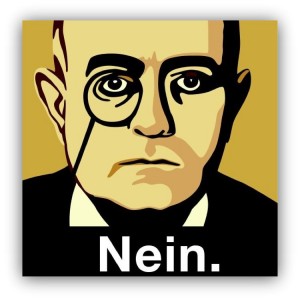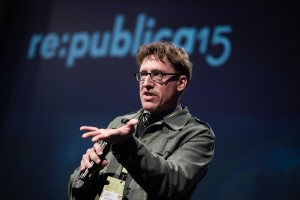

Eric Jarosinski, known on Twitter as Nein.Quarterly, is speaking in Prishtina on tonight (Thursday) at Dit’ e Nat’ at 7 pm.
On Twitter, Eric Jarosinski comes across as sardonic, cynical and – with an avatar of the German philosopher and critical theorist Theodor Adorno looking dour and wearing a monocle, austere.
Underneath Adorno’s severe visage is the lone word “Nein,” the German word for ‘No.’ Jarosinski writes under the nom de plume NeinQuarterly, primarily on Twitter, pioneering the art of writing social critique in 140 characters.
Jarosinski is visiting Prishtina as part of his #FailedIntellectual tour of the Balkans to promote his first book: “Nein. A Manifesto,” which is a compendium of his four-lined witticisms. He will be speaking Thursday night at 7 pm in Dit e Nat. His discussion, “First as Tragedy, then as Tweet– Philosophy, Culture, and Social Media,” will center on his book, his pioneering role in what is being called ‘Twitterature,’ and his impressions of Kosovo’s capital city.
Jarosinski says he came to his current work while he was an assistant professor of German at the prestigious University of Pennsylvania, struggling to write a book on transparency as a metaphor in German culture.
“I could not find a way of doing academic writing that I could live with,” he explains. “It was this tortured style of long sentences filled with qualifiers.”
Jarosinski adds that the pressure on professors to be complete experts on certain topics made him uncomfortable and limited his intellectual curiosity to certain topics. In 2012 he took to his smartphone and began composing tweets. Shortly thereafter he took himself out of the running to become a tenured professor. He began writing a tweet-style column for German and Dutch newspapers.
“The stripped-down nature of my writing really came from Dutch, where my vocabulary was more limited than in German,” he explains.
Today he has more than 130,000 followers on Twitter and is exploring new mediums for his message, like GIFs. (“I want to be able to control the cadences and the timing,” he says.)
His background as a professor and his studies of authority inform Jarosinski’s personas online and in person.
“For me, taking on a voice that is ridiculously authoritative exaggerates that authority and puts it into question,” he says, explaining that this is what he has been doing in his live presentations on his #FailedIntellectual Tour.
“I play the professor, but one who is a parody of intellectual authority, where I acknowledge that this is my interpretation.”
It is his training in German philosophy, critical theory, and his particular interests, like transparency of architecture, which Jarosinski brings as a lens to analyze the places he visits.
“The hope is that you can help make the everyday somewhat strange again,” he says of why he makes a presentation about a city he is visiting for the first time to people who live there. “I can bring the productive intellectual estrangement that comes from distance, which is sometimes required to make the invisible, or the things we take for granted, visible again.”
As a bit of a preview, Jarosinski said he might explore the presence of Bill Clinton and the eponymous boulevard.
“This is a man who is still alive,” he says. “I’m interested in the process of turning someone into a monument – he’s a middle aged American guy in a suit with a ‘90s cut.”
Jarosinski will speak in Skopje on Saturday, in Belgrade, on June 5, in Zagreb on June 6, in Sarajevo on June 7, and then he will be off to Paris.

In homage to Nein. we have below appended some of Jarosinki’s quotes from his interview, all of which are under 140 characters.
On his tweets:
“I don’t like to think of any of it as permanent because when I see it I want to edit it.”
“Short can be smart – short is the challenge.”
On Prishtina’s National Library:
“It’s rare to see a Brutalist building with so much glass, yet the cage on top also implies confinement and control.”
On the Ne Da(vi)mo Beograd protests:
“Belgrade and Sava Mala have all this authenticity. If they were smart, they’d build around it, not destroy it.”
On the changes wrought in the Balkans in the last two decades:
“The problem isn’t capitalism, it is dumb capitalism…a focus on short term results almost always leads to bad decisions.”
On why he doesn’t always tell audiences what they want to hear about their hometowns:
“I taught German philosophy, I’m not interested in teaching patriotic cheerleading.”
And now for some from the original Twitter:
In case of emergency: please be advised that your philosophy can be used as a hammer. To break the dreams behind the glass. #gutenacht
— Nein. (@NeinQuarterly) May 29, 2016
Thank you, consciousness. That will be all. #gutenacht
— Nein. (@NeinQuarterly) May 31, 2016
I met some @PrishtInsight operatives tonight. Good people. I suggest you follow them. Learn something. Then forget it over a beer sometime.
— Nein. (@NeinQuarterly) May 31, 2016
Things remembered in Prishtina: telling the kids at school that your ancestors were from Yugoslavia. Because cooler than Poland. #titotots
— Nein. (@NeinQuarterly) May 31, 2016
Sometimes all you understand in an @MTV Kosova video is "mutha fucka." And maybe that's enough. #universallanguage pic.twitter.com/cz9SqU3thy
— Nein. (@NeinQuarterly) June 1, 2016
American tourists. #prishtina pic.twitter.com/b8jHUj9UNt
— Nein. (@NeinQuarterly) May 31, 2016
02 June 2016 - 13:48

A political and budgetary deadlock has shut down all public transport ...

The 24th edition of the ReMusica International Music Festival in Kosov...

Early results from Kosovo’s local elections suggest that most munici...

In Prishtina’s rapidly expanding neighbourhoods a short walk can fee...